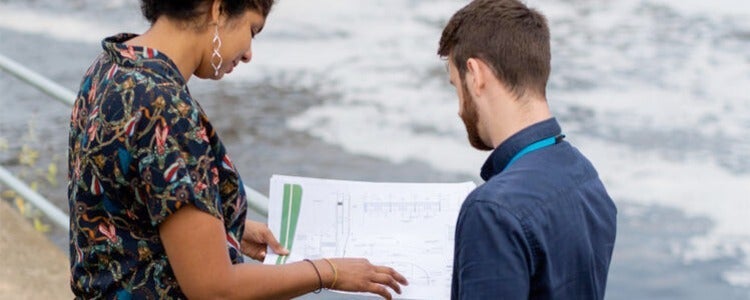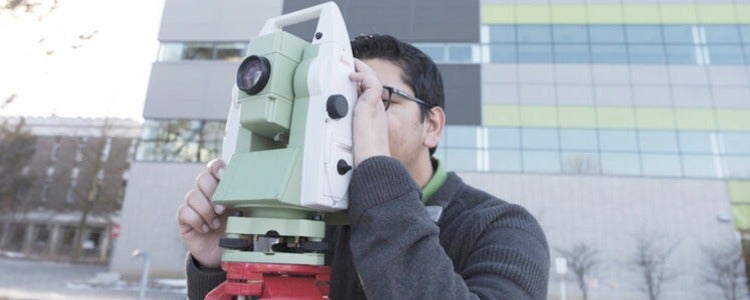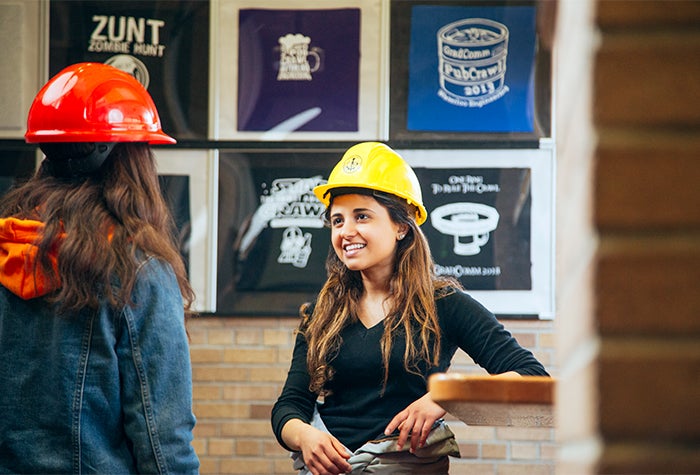What comes to mind when you first think of the University of Waterloo? If you thought of math, engineering, and co-op, you aren’t the only one. But there’s so much more to Waterloo than these programs.
If you thought Waterloo wasn’t for you because your interests are in the arts, sciences, environment, or health, let me introduce you to some of our lesser known but equally awesome programs.
Planning
It’s not every day you come face-to-face with the real challenges that affect our cities. Whether it’s our need for sustainable transport solutions or the issues that geographic inequality places on our society, you can be sure to find an urban planner on the front lines of these challenges!
So, what is an urban planner? You may be interested in this program if you’re fascinated with cities and how we interact with them. Planners design our communities, improve transportation, and create policies, all in an effort to better support the areas where we live, work, and play.

Socially motivated, community minded
The Planning program may be one of Waterloo’s best kept secrets! At least that’s what Danny thinks. He’s a third-year Planning student who saw this program as an opportunity to learn about the inequalities present in our cities.
As a high school student, Danny was passionate about finding a solution to social inequality. It wasn’t until he was volunteering at a local food shelter that he discovered the role a planner plays in developing those solutions. “I was talking to a planner who had come to the food shelter to analyze food bank usage. I asked him about his job and the rest was history.”
What’s next after a degree in planning?
Planning graduates have gone onto careers in transportation, heritage, land use, and even aviation planning! One thing is for sure: “You’re bound to make an impact wherever you go in planning. Planning is a form of social engineering — you’re going to find a way to improve the lives of people and our communities!"
Planning has allowed me to combine my interests in developing sustainable cities with real world experiences. Whether it’s developing site plans in PLAN 210 or developing planning proposals at my co-op job, this program has allowed me to put my best foot forward for the next generation of cities.
Geomatics
You may not realize it, but a lot of your daily routine may rely on spatial data. Whether you’re checking the weather, using a Snapchat geofilter, or looking up directions via Google Maps, you’re using geospatial data. The Geomatics program is perfect if you're interested in geographic data, computer science, or environmental issues.

More than just maps
In high school, I was computer savvy, analytical, and I loved the environment! Finding a program that fit my many interests proved to be a challenge. With a little help from my geography teacher, I was introduced to the Geomatics program at Waterloo, which proved to be the perfect fit for me!
As a map geek, the fact that I could use my analytical skills in a technically-focused program that also focused on sustainability was exciting. The co-op option was the cherry on the sundae. Not only did I find a program that matched my interests, I also get the chance to explore different pathways using my new skills.
What’s next after graduation
Equipped with spatial analysis skills (which are in high demand), you’ll be able to work in a wide variety of fields. From helping governments prepare for natural hazards like forest fires to tracking crime or the spread of disease, the career possibilities are endless!
My advice? Feel free to explore the applications of your skills and follow what makes you excited! What I’ve learned in Geomatics is applicable in so many fields!
Environmental Engineering
For most people, you may not think twice when flushing your toilet or turning on the tap. But what would happen if our access to water was limited? How do we prevent this from happening? These are the kinds of questions environmental engineers ponder.
Deeply rooted in one of Canada’s most prestigious engineering faculties, Environmental Engineering is the perfect program for those who want to develop and apply innovative solutions to our world’s biggest environmental challenges. Students are exposed to theories and labs on topics such as pollution remediation, water management, and wastewater management. And instead of simply learning about environmental solutions, students in the program are encouraged to apply their skills to real world issues.

Shape your own environment
For Will, his passions in environmental remediation began back in elementary school. He had a fear of storm drains! “I was terrified of where storm drains led but more curious on how they worked. My curiosity eventually led me to hydrogeology. As a result, I developed a passion for restoring our natural watersheds!” Today, Will has furthered his passion at Waterloo by participating in Engineers Without Borders and using his co-op terms to improve the world we live in.
What’s next after a degree in Environmental Engineering
Will sees a future in many environmental applications. “Resource conservation and water management are the hot spots for graduates, but the most important advice I can give out? See where your passions take you! Our environment plays an important role in everything we do, and that’s where a degree in environmental engineering comes in handy!”
In my first co-op term, I discovered how I could apply the skills we learned in class on stormwater management to real world applications. Not only was it an amazing experience, I was also able to discover my passion for water engineering and build up experience before I graduate!
Still unsure of what program to study?
Start by exploring Waterloo’s broad and diverse programs!
Related articles

How to choose a university program
A career worth pursuing is one you enjoy. After all, you’ll be working for a good part of your life. For those who lean toward subjects in the liberal arts, the best-kept secret about this kind of education is how it shapes you into a truly marketable employee whose skills are in high demand in a variety of industries.

What I wish I knew before applying to university
We sat down with seven student ambassadors to find out what they wish they had known when they were applying to university. We hope this helps you on your own journey to finding the right fit for you.

What to do when you can't decide
So, you don’t know what you want to do after graduation. The good news is, you’re not alone. If you know that you want to go to university, but you don’t know what you want program to apply to, don’t worry! We’ve got some tips that will help you to consider what your next steps could be.

